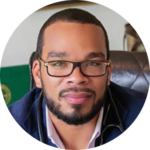In our “Physician Voices” podcast series, we welcome doctors to share their unique stories, expert perspectives, and helpful insights. In this candid Q&A with Fernando Porter, MD, a Maryland-based, board-certified family medicine physician, we explore:
- Balancing entrepreneurship and partnership to start a successful private practice
- Navigating bureaucratic hurdles and administrative burden as a solo practitioner
- Uniting diverse providers to share knowledge and improve patients’ access to care
This excerpt of our conversation has been edited for length and clarity. You can listen to the full episode below and find us on Apple Podcasts, Google Podcasts, or your preferred podcast platform.
How have physician collaboration, mentorship, and leadership played a pivotal role in your career, Dr. Porter? And was there a specific time when the knowledge you gained from this peer-to-peer connection helped you grow or improve how you care for patients and the community?
That’s an interesting question. What has really helped me personally is being in the director’s space for the Virtual Health clinic. I came on board to assist Privia with the virtual clinic platform in May of 2020. That gave me exposure to physician and business leaders within Privia. Just having regular conversations with them has supported my growth, not only as a provider but also as someone who has a desire to understand the business of medicine.
I had a friend of mine recommend the book The Innovator’s Dilemma, which literally changed my life. That became my framework. It helped me recognize that I was maybe underestimating how large a role I and other physicians have in transforming healthcare. With where healthcare is right now, we can be significant players in how we move the needle forward to deliver care to patients, how we train our physicians, how physicians are compensated, and more.
 Read Dr. Porter’s op-ed for the American Medical Association on creating a “first-class” telehealth experience.
Read Dr. Porter’s op-ed for the American Medical Association on creating a “first-class” telehealth experience.
There’s also the sense of community and collaboration with the physicians themselves. Long gone are the days where physicians would graduate from residency, hang up their shingles, join their medical societies. And then go to meetings on a regular basis with those medical societies that connect you with the cardiologist, who’s also your friend, and the OB-GYN who delivers your kids. That used to be a thing: physicians were a community. Not only that, but they were friends. Those medical societies still exist, but people just don’t participate in them as much as they once did. My wife’s grandfather was a doctor, and that all seems like a relic of his generation. That’s since changed because medicine is now a corporation, so to speak, right?
Now, you still have that camaraderie in residency. But as soon as you leave residency and go out into the community, you don’t really know the cardiologist, rheumatologist, dermatologist anymore. That’s why it’s so valuable participating in Privia’s physician-organized delivery “POD” meetings. That’s why I enjoy getting to know my fellow practitioners and going to the annual National Physician Advisory Council. It’s important to me to meet and see the doctors who are leading the different markets throughout Privia.
All of that is essential. Privia provides us with an advantage that most private-practice physicians don’t inherently have unless they are interested and invested in doing it and trying to go get it. So, directing Virtual Health, reading The Innovator’s Dilemma, and fostering a community of physicians are the three things that have been really instrumental in my maturation and getting me to where I am now.
A major challenge in healthcare today — and perhaps even more so in the coming years — is translating that tremendous, innovative potential into realistic, achievable progress. One strategy to balance the two is physician leadership. As healthcare evolves, how important is it for the industry to empower these leaders to lend their clinical voice and lead healthcare’s transformation?
It’s hugely important, mainly because physicians are the ones doing the work of caring for patients. The needle doesn’t move unless the folks who have to do it, do it, right? We need the autonomy to dictate how we practice medicine. I’m not saying we should do whatever we want, but if we’re not bought into the purpose and mission, then it’s just information in and information out, otherwise it falls on deaf ears.
I’ll sometimes say to my friends and colleagues, “We’re in the ‘Wild Wild West’ of where our industry is right now.” We’re in such a growth space. Everybody has a lot of great ideas, and everybody has a lot of strong opinions about the direction we should go in or how we should approach a certain topic. I believe the folks who will be most successful are those who collaborate with physicians and ensure that physicians have a seat at the table, because, like I said, we’re the ones doing the work.
 Hear Privia Health CEO Shawn Morris discuss how “inspired doctors and physician leaders” can drive value-based care.
Hear Privia Health CEO Shawn Morris discuss how “inspired doctors and physician leaders” can drive value-based care.
When you look at these innovative ideas — and there are definitely some great ideas — what you often find is that the ideas are much further down the line than what reality permits. Physicians lend a lens, one that shows what’s actually happening in the real world. That perspective can allow us to meet patients and the system where it truly is versus where it should be. Maybe it’s a service or offering that is awesome but, due to costs, unfeasible at the moment. Or maybe it’s taking the quantum leap from fee-for-service models to value-based care. What does that transition look like? How can you do that without jeopardizing your staff or generalized revenue that you get month to month, year to year?
There are so many questions we have to answer. I’d argue that you get more equitable, realistic answers when you put physicians in leadership positions and engage us in these discussions. Privia is great about elevating the doctors who have done a tremendous job of getting the organization to where it is from the standpoint of physician leadership, business development, empowerment, and technology. Now we’re starting to identify the future clinical leaders who will step up to drive the innovation forward and continue the disruption.
 Fernando Porter, MD, a board-certified family medicine physician and founder of Capital City Primary and Immediate Care, located in Silver Spring, Maryland. Dr. Porter also serves as the Medical Director of Privia Virtual Health and Life Ambulance Services based in Atlanta, Georgia. In his spare time, Dr. Porter enjoys cycling, watching sporting events, traveling, and spending time with friends, family, and his wife, DeShaun.
Fernando Porter, MD, a board-certified family medicine physician and founder of Capital City Primary and Immediate Care, located in Silver Spring, Maryland. Dr. Porter also serves as the Medical Director of Privia Virtual Health and Life Ambulance Services based in Atlanta, Georgia. In his spare time, Dr. Porter enjoys cycling, watching sporting events, traveling, and spending time with friends, family, and his wife, DeShaun.










Related Articles
How to Keep Your Patients From Skipping Mammograms
Kristin Schraa, MD, with Virginia Women’s Center shares how women’s health providers can encourage patients ...
3 Ways Healthcare Can Integrate Behavioral Health and Primary Care
Integrating behavioral health with primary care can lead to better patient outcomes — but how ...
How Can Physicians Support Postpartum Mental Health?
On average, 13 percent of mothers in the United States will develop symptoms of postpartum ...
Engaging Patients in Annual Mammograms
Studies show that a little over 66 percent of women aged 40 and older get ...
What Do Medicare-Aged Patients Want in Their Healthcare?
Within the next 20 years, 20 percent of Americans will be 65 or older. It ...
How Health Systems Grow Stronger With Privia Health
Discover how we helped Health First upgrade technology, align physicians, and accelerate toward value-based care. ...